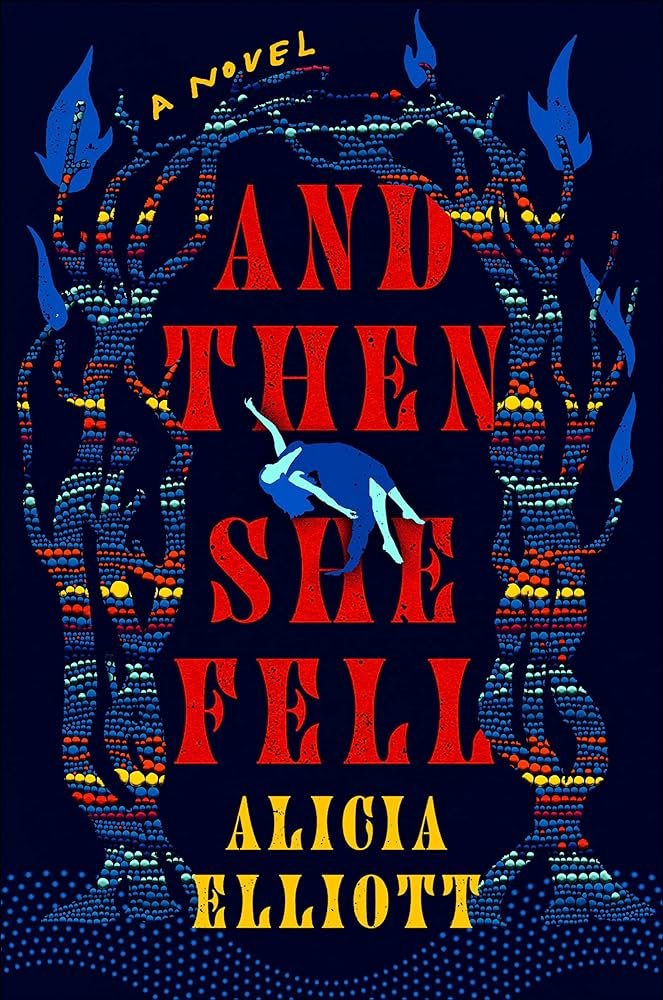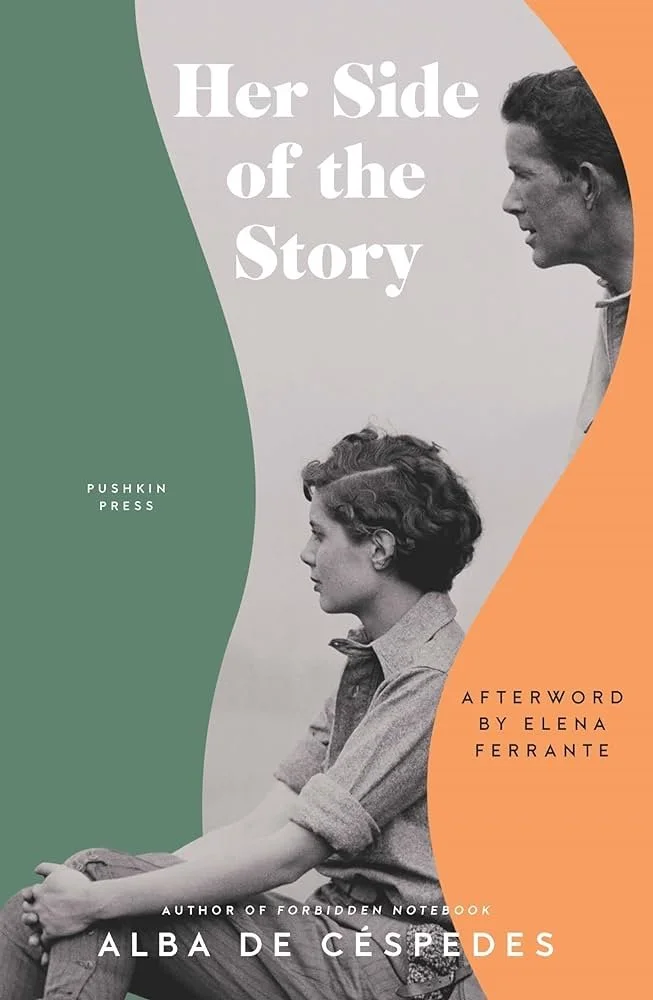It's tricky trying to summarize how I feel about Alicia Elliott's debut novel as the experience of reading it was often frustrating, but the power of its voice and the complexity of the many issues it raises have inspired me to engage in a lot of discussion with my bookclub about it. There's also a very clever narrative twist a long way into the book which helped me to emotionally engage with it in a way I struggled to up until that point. The story focuses on narrator Alice's experiences grieving the loss of her mother and living in a predominantly white Canadian neighbourhood separate from her familiar indigenous community. She's a writer endeavouring to compose an updated version of the Haudenosaunee Creation Story, a wife to a kind-hearted white man who is academically researching her culture and a new mother to an infant she feels she's failing. Increasingly she senses that inanimate objects, creatures and strange visions are speaking to her. This introduces the question about whether she's suffering from mental health issues, the disorientating effects of sleep loss or whether she's deeply communicating with spirits/ancestors from her culture (or perhaps some mixture of all of these things.) So there is quite a lot going on and it's not surprising that Alice feels continuously overwhelmed!
It's quite a surprise in the prologue when Pocahontas (or Matoaka) begins speaking to Alice through the television screen. This feels both comic and playful, like something from a horror story. It's also meaningful in how there is a darker truth to indigenous history/experience than what non-First Nation groups acknowledge in popular culture. I feel like Elliott tries to balance these three modes throughout the novel's narrative which is a difficult thing to pull off. The novel uses a very conversational style of writing which makes it very personal and immediate. I appreciate how this conveys a strong impression of Alice's point of view and state of mind however, to me, it can sometimes feel too much like a rant where Elliott hammers through messages rather than letting them arise naturally within the story. Alicia Elliott wrote a very interesting personal essay about perceptions of mental illness: https://www.thestar.com/entertainment/books/the-power-of-alicia-elliott-how-the-indigenous-author-embraced-the-unreality-of-fiction-and/article_b0e3c11d-7092-5c59-ac2a-07c83b34a815.html It's really challenging not to dismiss someone's perspective when they've been categorised as suffering from “madness”. At the same time, there are so many practical difficulties which accompany this experience especially when clear and honest communication becomes nearly impossible.
Alice's daily physical interactions seem fairly benign – being gifted dvds, buying alcohol from staring shop assistants and being pounced upon by a hyper vigilant neighbour. Certainly there is unacknowledged prejudice and micro aggression within these encounters but Alice's reactions often feel out of proportion to what's occurring. I understand she is frustrated that the white community she's surrounded by can't understand her perspective and that she desires to exhibit positive representation to deflect stereotypes about Native people and feels the need to keep up appearances – especially to her husband Steve. This poetic line from the novel seems to really encapsulate her experience: “I'm a puddle pretending I've got shape and form.” However, it feels like her increasing panic about her predicament would be tremendously eased if she were to speak honestly with others about what's happening and her state of mind. Instead, she constantly covers this up and keeps an increasing amount of “little secrets” from Steve. Though we don't get much backstory about the formation of their relationship this seems to be a consistent aspect of it: “I've kept so much from him from the very beginning. Edited my life to make it seem a little less tragic and a lot more functional.” Of course she wants to present herself as capable/confident but a big part of any successful long term relationship is allowing a partner to see your vulnerabilities. Instead, Alice seems to be trying harder to cover them up so the truth of how she's feeling can only come out in erratic or paranoid behaviour.
Perhaps this is part of the point of the story. However, it makes it frustrating and difficult to empathise with Alice when she's not willing to let others into what she's experiencing except through this narrative and her rewriting of the Creation Story. I'm aware my reaction might be biased because this character's life is very different from my own. I want to listen to what this book has to say and I'm not trying to minimise the impact of her cultural heritage, position in this society and the difficulty of new motherhood. I was really struck by the lines: “Motherhood is sacrifice. Not metaphorical sacrifice. Literal sacrifice. Every day I feel like I'm destroying pieces of myself to win the favor of this insatiable demigod who wants and wants and wants.” It must feel devastating to rapidly lose yourself in this way and feel like this baby is the antagonist while also loving your child. I've found it really interesting to compare Elliott's novel with “Soldier Sailor” by Claire Kilroy since there are parallels in how new motherhood causes such a terrifying physical and mental breakdown and sense of isolation. What's clear from both is that it's a tremendous strain no matter the circumstances and support/lack of support from one's family/spouse.
It was a complete surprise to me how the story switches its nature later in the novel just as Alice's manic energy and all-consuming paranoia become too much to bear. By getting an outside perspective of Alice (and getting a heartrending peek at the many directions her life might have taken) I suddenly understood the tragedy of her plight better. I'd previously felt sympathy for how overwhelmed she's been with the grief for her mother, the responsibilities and sleeplessness of new motherhood, separation from her Indigenous community, wavering mental health, semi-reliance on drugs/alcohol and frustration trying to honour her heritage by rewriting its stories. But being locked in her point of view also made me feel like a therapist listening to a hopelessly tangled diatribe and this made the reading experience increasingly laborious. It's not often that it seems worth it to read through hundreds of pages to get to a pay off like this. But, in this case, I am very glad I read until the end. It felt necessary to see Alice's increasing frenzy from the inside in order to really know how she got to this point of absolute despair. There's a pleasure in re-viewing the events that have come before given that the nebulous voice is given a personality. It's also quite playful and inventive how the author has structured the book as if self consciously drawing upon the kind of popular culture films she frequently references. I was reminded of the films 'Get Out' in the dinner scene, 'Interstellar' in the family reunion across time – as well as the numerous movies which have drawn upon concepts of alternate realities/the multiverse. Some might see this as derivative but I think it felt natural for this story and a way to show the tension Alice experiences as someone whose identity is a blend of both Indigenous and colonial culture. I found this concluding section really heartwarming and moving, but I'm sure not all readers would agree.
The title of the novel is taken from the story of the Sky Woman being dropped by The Great Spirit into a hole so that she falls towards the Lower World. But I like that it also has a popular culture meaning in how Alice connects to Veruca Salt from Willy Wonka because she thinks if she makes the wrong choice the floor will fall out from beneath her. There's also some “Alice in Wonderland” influence given the protagonist's name, that Sky Woman falls (or is pushed) down a hole and at a disastrous dinner party Alice believes that guests shout “Off with her head” at her. I'm glad to have read this book and to have received Alicia Elliott's point of view. I do question whether she might have been able to use a different writing technique or structure to better tell this story. It's really difficult to say because Alice's mindset is so messy it feels like the narrative needs to emulate that and if it'd been more formalised it might not feel so authentic. So it's difficult to know how to rate this novel or whether I'd recommend it. I'm continuing to mull it over and I'd be very keen to hear reactions from other readers about the book as a whole.









